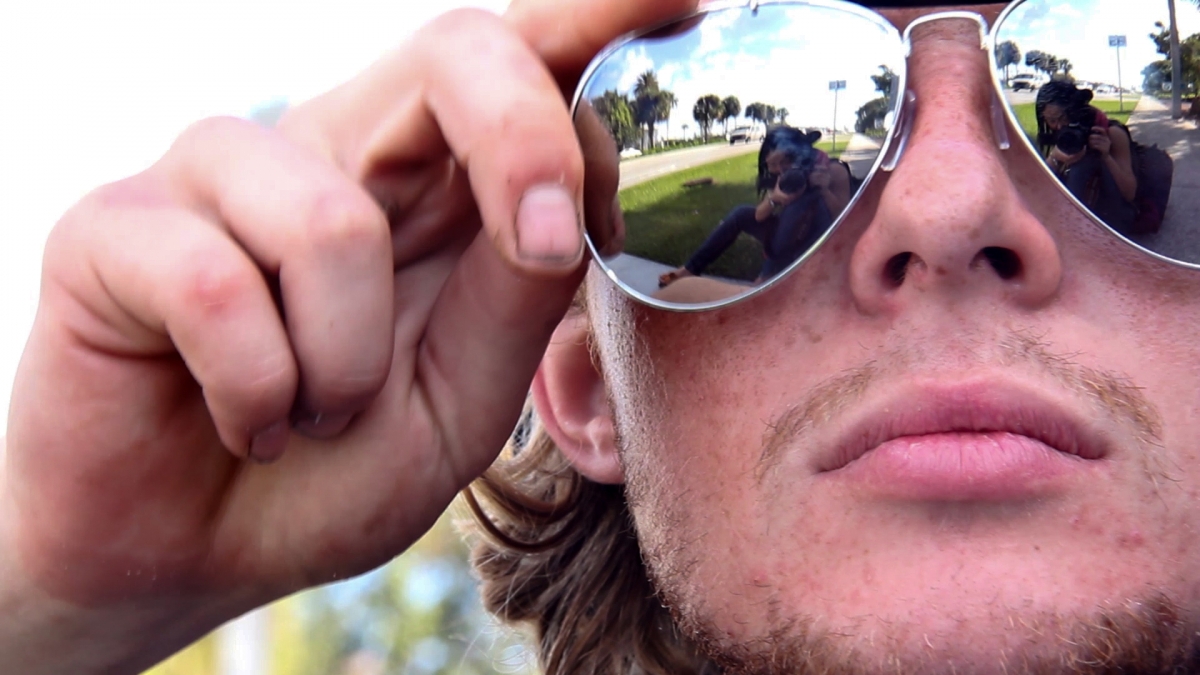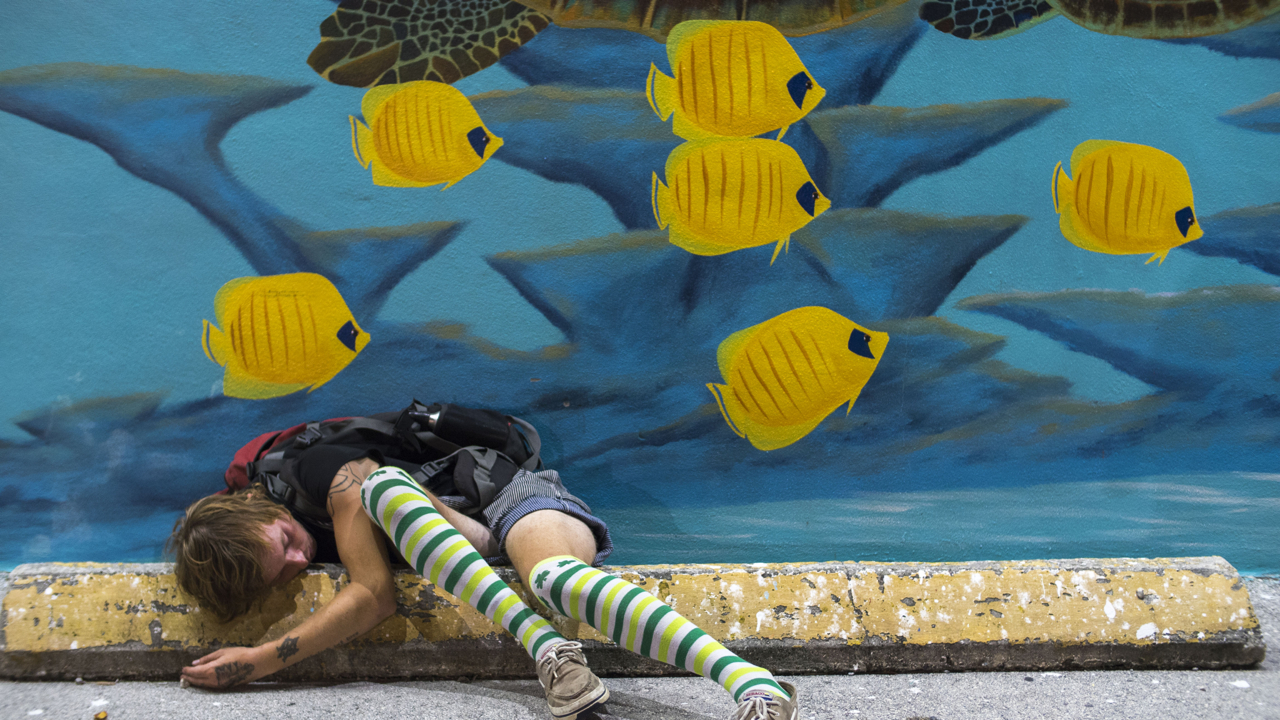Doc Star of the Month: Traveling Philosopher Dylan Olsen, Nanfu Wang's 'I Am Another You'

For this column at least, January has become what I'll call "mental differentness" (as opposed to "illness" or "disability") month—a chance to celebrate those who refuse to be "fixed" by (and thus incorporated into) society, who instead choose to valiantly live their own truth, in parallel realities far from our own. A year ago Michelle Smith, star of Garrett Zevgetis' Best and Most Beautiful Things, and a proud kinky nerd who happens to be legally blind and has Asperger's syndrome, inaugurated this column. And now Dylan Olsen, vagabond protagonist of Nanfu Wang's poetic and important I Am Another You, takes the Doc Star baton.
China-born filmmaker Wang (who proved her fearless chops with 2016's Hooligan Sparrow, following that titular nom de guerre character as the vocal anti-corruption activist was trailed by the secret police) met Dylan at a hostel after buying a one-way ticket to Florida, inspired to explore a part of the USA she knew nothing about. Dylan, young and charismatic, in turn inspires Wang to trail him with her camera as he travels the country with neither plan nor money, relying solely on "the kindness of strangers"—which, surprisingly, seems to mostly work out pretty well for him. As they begin to spend every waking and sleeping hour together, though, Wang's initially romantic notions regarding Dylan's lifestyle take a turn for the dark. Did Dylan, who'd been diagnosed with schizoaffective disorder years ago, really choose this life of absolute freedom that he earnestly champions, or was it society that made that choice for him?
Documentary is thrilled to have been able to connect with Dylan via phone—while he was at a busy truck stop in Mississippi, no less—to discuss all this and more prior to the film's January 29th premiere on PBS' Independent Lens.
So why did you let Nanfu tag along with you in the first place—and with a camera? Had anything like that ever happened to you before?
When I first started traveling, and I started witnessing all these amazing events—whether it be the "supernatural," I guess, or whether it be nice people, or weird situations, or just the spontaneity of being nomadic—I'd always thought, "You know, I wish somebody would follow me around with a camera." And so it kind of manifested in that way, where I was at the hostel in Florida, and she took an interest in me. I just noticed her filming me quite often as I working and as I was doing my beads and socializing. And then she approached me and said, "Hey, can I follow you around on the street for a day to see how you survive?" And I said I'd think about it.
And so I think it was the next day I said, "You know, one day is not enough. How about you do it for a month?" And then she got really excited. Then that's when it started. That was awesome.
How do you feel about the film—and especially the ethical choices Nanfu made during production? Were you OK with her visiting your family without you being there? Any scenes you wish had ultimately been cut?
I absolutely love it. For Nanfu and everybody involved, it was really a delicate kind of project, kind of me pulling my pants down in front of the world. But I was really happy, and I'm super-happy for everyone involved.
Nanfu is an artist, and her description of me being her hero of this story, or whatever you would call it, was endearing. And it was sweet. I was really hoping for more of a poetic examination, of something else in an artistic way. No, I didn't expect my family to be there, so to me that was kind of a curveball. Well, she asked my permission. But I'm not disappointed. It's an honest story about a true person, but I was kind of hoping for more of my poetry and creativity to be exposed. But she exposed as much of my poetry and as much of her story as she could, combined. And her editing is fantastic. And her camera angles in the shots that she takes, and just her devotion, I found fantastic.
It was just like I was being undressed a little bit too much—not in the way of being offended, but it was opening doors. The one thing that was disappointing to me was this: It was first her following me on the streets, and then she wanted to see where I came from, and then she called me one day and said, "Hey, wherever you're at I want you to direct, be the main actor, do the casting and do a screenplay to describe the mind that you have"—whether it's labeled as schizoaffective or…I hate to even use that word.
So they shot me for three days and three nights, and followed me around. And that project was lost throughout the documentary, which was the most exciting part for me because that was me being an artist. That was me saying, "Alright, this is where I can maybe open some doors for a future." Maybe somebody will bite onto my creative ability, and my writing and my passion; that was kind of neglected in a way.
I always knew I could publish books, literature or whatever—whether it's children’s stories, or novels, or even just my story, or anything whatsoever. But this was the first experience I'd ever had with film. So when they were filming me in Marathon, when I was directing and doing everything, everyone was like "Wow!" They were amazed. They said, "You're a natural screenwriter, this is incredible." And so that really got me excited.
Nanfu struck me as very naïve from the start in romanticizing this lifestyle. Do you think you changed her in any way? And conversely, has Nanfu's film—and having your story exposed to the wider world—changed your life for better or worse in any way?
Well, I can't speak for Nanfu personally. However, I know that it did change her in some ways, of maybe having confidence and just a different experience. She loved it, though. As far as me, how it changed me, it offered a great deal of introspection, where I could see myself. It was, I guess, a paradox, but to learn something about how I am, and how I act, how I would be viewed by the people I'm around everyday. But I mean, it was just a level of growth for both of us.
The film upends a lot of preconceived notions about those who live on the streets. It even made me rethink the definition of homelessness; if "home is where the heart is," you seem to have a home in every city in which you find a likeminded street community. It also reminded me of famed neurologist Oliver Sacks, who spent his life de-stigmatizing what we call mental illness—which might be more accurately described as "mental differentness." Are there any societal judgments that especially bother you?
It's kind of expected, since we live in an oligarchy, that if you're not conforming to the status quo…But not every homeless person is like me. I was brought up with the words "mental illness," and I just think that in a lot of cases, why do we use the word illness? It's just different, you know. There's nothing wrong with you.

I do not believe in mental illness. And to be honest, the reason Nanfu wanted me to explain the whole schizophrenic thing was that when she had her premiere for Hooligan Sparrow, and we were at dinner in Salt Lake City somewhere, she just got really frustrated: "Why are you so drunk all the time?" And I just showed her this video on YouTube that made her think. I said, "Well, this is why, and I don't like to use that word." But it was kind of my segue, in hopes of explaining what's really going on, on my level. Not like I do not believe in mental illness; it's just everybody is categorized and expected to be equal. That's why we have public schools, and we're trained and indoctrinated—whether it be religion, education, politics or whatnot.
It's a pollution of thought, and that's what messes people up. So that's a whole other can of worms, but I have to use language in the way that people will understand it, to coerce them into really seeing a bigger picture.
Speaking of preconceived notions, the film also upended my ideas about Mormonism. Your family, while religious, seems very loving and patient—and, most surprising to me, nonjudgmental of the choices you've made throughout your life. Is your family an outlier, or is the Mormon Church's congregation actually more diverse than the secular media portrays?
Well, my family is no longer in the Church. So after (my parents') divorce, and after I fell away, I kind of got pretty raw with my family about being lied to for so many years. Granted, I have learned so many wonderful and beautiful things from the Church. But even before my family became Mormon it was just family—just that simple message of family and love, no matter what.
Your brother is religious, though, right?
No, not at all. He was in the film, yeah. So that's the other thing about the film. This was filmed over several years, with quite a broad spectrum of one family's evolution, and my evolution as well. So there are moments when I watch the documentary and I see myself being so immature, just being a whiner. Where I am now, there's so much difference from every angle. Even with Nanfu, there's so much difference in how her perspective has changed. And not because of me, but just because we're all evolving and growing.
It's a common thread that I've witnessed growing up, basically, in the Vatican of Mormonism in Utah. I've witnessed so many disenfranchised youths that just already knew that it was bogus but had to abide. And then they end up entrenched in drug abuse, or just loneliness or depression. And it's not just Mormonism that does that. I mean, Catholicism, anything. I even heard an atheist the other day talking. I was talking to him, and he said, "I was raised on atheism, and so my whole life I grew up wondering, What's the point?" And that was the first time I've ever heard that. That was shellshock for me.
Traditionalism is poison. There are a few basic truths that I think are around, and Mother Nature already had them for us. Then mankind decided to come up with words to confuse each other, and to blame other people for what’s going wrong. That's a whole other book of tales.
You're still close to Nanfu?
Oh, yeah. I'm in touch with her and with my family. I'm kind of the social butterfly of my network of best friends, and people I hold dear to myself.
I'm a philosopher, I'm a traveler and I'm kind-hearted. I just want to be a positive piece of the kaleidoscope, to leave a spark, a firework for everybody to see and make their own interpretation of. That's the message of I Am Another You. We all see that same firework. And you know, some of the kids might be scared of the noise, but they'll learn to get used to it. Because they're not alone.
I Am Another You premieres January 29 on PBS' Independent Lens.
Lauren Wissot is a film critic and journalist, filmmaker and programmer, and a contributing editor at both Documentary and Filmmaker magazine. Her work can also be regularly read at Salon, Bitch, The Rumpus and Hammer to Nail. Currently, she serves as the international features programmer at the Hot Springs Documentary Film Festival.
